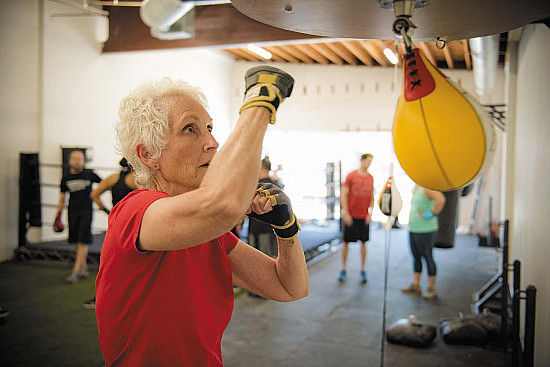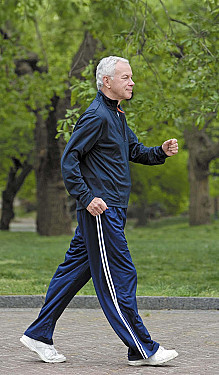What can you do to maintain exercise motivation?
Here are six ways to stay engaged and committed to your fitness.
- Reviewed by Howard E. LeWine, MD, Chief Medical Editor, Harvard Health Publishing; Editorial Advisory Board Member, Harvard Health Publishing

Approximately one in every two people who begin an exercise program quit within the first six months, according to some estimates. Why is it so challenging to stick to regular workouts?
“Declining motivation is usually the main culprit,” says Vijay Daryanani, a certified personal trainer with Harvard-affiliated Spaulding Outpatient Centers at Marblehead Jewish Community Center and Marblehead YMCA. “People understand the importance of regular exercise and can be excited to begin, but staying engaged for the long term can be challenging.”
If lack of motivation has derailed your exercise, here are some ways to get back on track.
See the value. When it comes to fitness, people often have unrealistic expectations. “It’s so common to get frustrated if you don’t see or feel results in a short time,” says Daryanani. “No matter what their goal, people need to recognize the value of dedicating any time and effort to exercise. When you accept that fitness is an ongoing journey, you’re more likely to be motivated to keep moving.”
Focus on one goal. “A good way to restart your exercise routine is to choose an initial goal you want to achieve,” says Daryanani. For example, if you want to build more muscle, then concentrate on strength training. If your goals are to improve mobility and reduce your fall risk, try yoga or tai chi classes. Want to run a 5K? Base your workouts on running and power walking.
“This approach can help you stay committed and mentally engaged, as you are focused on something specific you want to achieve,” says Daryanani. “It’s also easier to measure your progress as you go — you can lift heavier weights than when you began, go deeper into yoga poses, or run or walk at faster paces and longer distances.” As you move toward your goal, your motivation can expand to other forms of exercise, so that you can build a well-rounded fitness routine.
Get a workout buddy. Enlist an exercise partner, such as your spouse, sibling, friend, or neighbor. “Having someone to exercise with makes you accountable to show up for workouts,” says Daryanani. A workout buddy can also offer additional support, as you have someone to share your experiences with.
A 2024 study published in JAMA Network Open found that older adults who discussed their exercise regimen with peers were able to increase and sustain their physical activity levels more effectively than those who focused solely on self-motivation. If you can’t find a partner, attending classes offers similar advantages, as it provides structure, accountability, and camaraderie within the group.
Match your exercise to your personality. Research has shown that people with certain personality traits may benefit from specific types of exercise. A study published online July 7, 2025, by Frontiers in Psychology found that extroverts tend to thrive in high-energy group sports and activities.
Individuals with what the researchers called the “neuroticism” trait — associated with a tendency to worry — are better suited for short bursts of activity with breaks and thrive in environments that provide some privacy.
Conscientious people, who the researchers defined as orderly and driven to achieve goals through planning and persistence, are more likely to gravitate to all-around workouts that combine aerobic and strength training. It’s no surprise that the researchers found people enjoyed exercising more when doing workouts that matched their personalities.
“If you struggle with motivation, try something different,” says Daryanani. “It could be that you haven’t found the right type of exercise or activity.”
Find role models. Individuals you find inspiring can be great motivators. These can include athletes, fitness personalities in your age group, or individuals who have overcome obstacles like a serious injury or health issue and returned to fitness. “We can learn much from people we find inspiring,” says Daryanani. “They have motivation issues at times, too. How do they stay engaged, and how do they overcome setbacks and obstacles?”
Make fitness part of your persona. There are certain ways we want to present ourselves. We want to dress well, speak properly, be a good person, do good work, and set an example for others. “A commitment to exercise is part of this persona,” says Daryanani. “Taking care of yourself shows that you are dedicated and value good health. People see that and recognize it. It becomes part of who you are.”
This article is brought to you by HarvardHealthOnline+, the trusted subscription service from Harvard Medical School. Subscribers enjoy unlimited access to our entire website, including exclusive content, tools, and features available only to members. If you're already a subscriber, you can access your library here.
Image: © PeopleImages/Getty Images
About the Author

Matthew Solan, Executive Editor, Harvard Men's Health Watch
About the Reviewer

Howard E. LeWine, MD, Chief Medical Editor, Harvard Health Publishing; Editorial Advisory Board Member, Harvard Health Publishing
Disclaimer:
As a service to our readers, Harvard Health Publishing provides access to our library of archived content. Please note the date of last review or update on all articles.
No content on this site, regardless of date, should ever be used as a substitute for direct medical advice from your doctor or other qualified clinician.
















